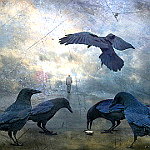Sins of a RPG designer...
13 posts
• Page 1 of 2 • 1, 2
Sins of a RPG designer...
In your opinion, what are the 10 greatest "sins" an RPG designer can commit when designing a new game?
-

John Michael Crovis - Marmoset
- Posts: 58
- Joined: Thu Jun 23, 2011 9:43 pm
Re: Sins of a RPG designer...
I did a blog post a few months back about the Seven deadly sins of game design...I'll see if I can find it.
Edit:
Edit:
-

vulpinoid - Howler
- Posts: 320
- Joined: Sun Apr 26, 2009 4:10 am
- Location: Australia
Re: Sins of a RPG designer...
My first thought was simply ripping off one of the staples. That's on your list.
I think another problem is straying too far from the mainstream. If a game is "totally" novel, as some people pitch their game, I'm not going to be interested in it. I don't want something totally new. I want an RPG that has some of the comforts I'm accustomed to. And I don't mean simply my group of friends.
In general, I think lists can be helpful but only if you're already very familiar with RPGs. This is one of those things where you have to develop the knack for yourself and trust the know-how you have. For each rigid rule we might come up with, someone could make the main premise of his/her game showing how we're wrong.
I think another problem is straying too far from the mainstream. If a game is "totally" novel, as some people pitch their game, I'm not going to be interested in it. I don't want something totally new. I want an RPG that has some of the comforts I'm accustomed to. And I don't mean simply my group of friends.
In general, I think lists can be helpful but only if you're already very familiar with RPGs. This is one of those things where you have to develop the knack for yourself and trust the know-how you have. For each rigid rule we might come up with, someone could make the main premise of his/her game showing how we're wrong.
-

trodgers - Marmoset
- Posts: 92
- Joined: Mon May 30, 2011 5:34 pm
Re: Sins of a RPG designer...
You've heard the saying: it's not the getting there; it's the journey. I don't think a game has to be finished for it to have been a worthwhile endeavor.
-

trodgers - Marmoset
- Posts: 92
- Joined: Mon May 30, 2011 5:34 pm
Re: Sins of a RPG designer...
I'm trying to think of my own before checking out vulpinoid's list and commenting on that.
First of all, the game should be fun.
It needs to present interesting choices. Taking action should have some thought behind it, not following a programed flowchart. These options can be both in character and out - Moral dilemmas, limited resources, an interesting array of weapons - but there should never really be one attack that rules them all, one best path of advancement, or a single character class that is clearly better.
Elegance - that is ease of use and good presentation - is a goal to strive for, but not necessarily required. However, failure to acknowledge this ideal at all is a problem.
Be kind to your audience, and give them what they need to play. Godzilla doesn't belong in Advanced Squad Leader, but it would be remiss without rules for MG-42 teams. If the game is about hot-shot pilots, then present interesting aircraft and some mechanic that makes combat fun and the players suitably good.
A game must have awesome - something that makes the players want to play. It could be a learning experience, enacted through impressive detail and a true understanding of the difficulty faced by historical commanders. Or going in the opposite direction, something that allows them to go truly wild and be heroic despite whatever odds are in front of them.
The designer must make the work their own somehow. There are certain staples of the cyberpunk genre, for example, and numerous games have a background of neon on noir. However a few stand out such as Shadowrun, which combines it with magic and Cybergeneration, where the players are transhuman children.
Games should be tested. Of course the author knows the rules, and the intentions behind them, but it is unlikely the designer will personally oversee every session. Thus one must get a group to make sure everything is clearly stated, and conflicts have an inferred resolution if not specifically spelled out. Furthermore, this allows a chance to make sure there are interesting choices present. There is an anecdote about Steve Jackson testing Ogre and nobody ever tried taking a defensive force of all hovercraft - they lacked firepower, armor, and range - so it seemed like a bad idea. Yet in practice, the ability of that unit to hit an run meant such a selection would actually be overly powerful - destroying super-tanks with ease. So check even the counter-intuitive elements to avoid a single best choice.
Know what your game is. Teaching aids should have additional educational content, and realistically portray the event in question. Horror games should have elements that make the character vulnerable.
I don't think there has to be one central mechanic, but there does have to be a reason why it switches. I'd imagine that fighting battleships in space would be different from hand to hand. Setting up a difference between magic and psionics might make sense - but why should be in the background, and should suitably make each feel unique.
Finally, do not accept a game as simply finished. Adding new material can keep people interested. If a lot of people have a problem with some aspect, then perhaps your playtesters missed something and you need a small revision.
OK, that is ten on my own, now to wait for some commentary and read vulp's list.
First of all, the game should be fun.
It needs to present interesting choices. Taking action should have some thought behind it, not following a programed flowchart. These options can be both in character and out - Moral dilemmas, limited resources, an interesting array of weapons - but there should never really be one attack that rules them all, one best path of advancement, or a single character class that is clearly better.
Elegance - that is ease of use and good presentation - is a goal to strive for, but not necessarily required. However, failure to acknowledge this ideal at all is a problem.
Be kind to your audience, and give them what they need to play. Godzilla doesn't belong in Advanced Squad Leader, but it would be remiss without rules for MG-42 teams. If the game is about hot-shot pilots, then present interesting aircraft and some mechanic that makes combat fun and the players suitably good.
A game must have awesome - something that makes the players want to play. It could be a learning experience, enacted through impressive detail and a true understanding of the difficulty faced by historical commanders. Or going in the opposite direction, something that allows them to go truly wild and be heroic despite whatever odds are in front of them.
The designer must make the work their own somehow. There are certain staples of the cyberpunk genre, for example, and numerous games have a background of neon on noir. However a few stand out such as Shadowrun, which combines it with magic and Cybergeneration, where the players are transhuman children.
Games should be tested. Of course the author knows the rules, and the intentions behind them, but it is unlikely the designer will personally oversee every session. Thus one must get a group to make sure everything is clearly stated, and conflicts have an inferred resolution if not specifically spelled out. Furthermore, this allows a chance to make sure there are interesting choices present. There is an anecdote about Steve Jackson testing Ogre and nobody ever tried taking a defensive force of all hovercraft - they lacked firepower, armor, and range - so it seemed like a bad idea. Yet in practice, the ability of that unit to hit an run meant such a selection would actually be overly powerful - destroying super-tanks with ease. So check even the counter-intuitive elements to avoid a single best choice.
Know what your game is. Teaching aids should have additional educational content, and realistically portray the event in question. Horror games should have elements that make the character vulnerable.
I don't think there has to be one central mechanic, but there does have to be a reason why it switches. I'd imagine that fighting battleships in space would be different from hand to hand. Setting up a difference between magic and psionics might make sense - but why should be in the background, and should suitably make each feel unique.
Finally, do not accept a game as simply finished. Adding new material can keep people interested. If a lot of people have a problem with some aspect, then perhaps your playtesters missed something and you need a small revision.
OK, that is ten on my own, now to wait for some commentary and read vulp's list.
Games of imagination are never truly done. Yet tomorrow we shall start another one.
my new RPG blog.
my new RPG blog.
-

Chainsaw Aardvark - Mod Ape
- Posts: 963
- Joined: Fri Sep 08, 2006 4:04 pm
- Location: Buffalo Grove IL
Re: Sins of a RPG designer...
I also do which isn't much, but it's enough for me.
-

koipond - Baboon
- Posts: 570
- Joined: Tue Jan 19, 2010 6:40 am
- Location: Toronto, ON, CANADA
13 posts
• Page 1 of 2 • 1, 2
Who is online
Users browsing this forum: No registered users and 15 guests


